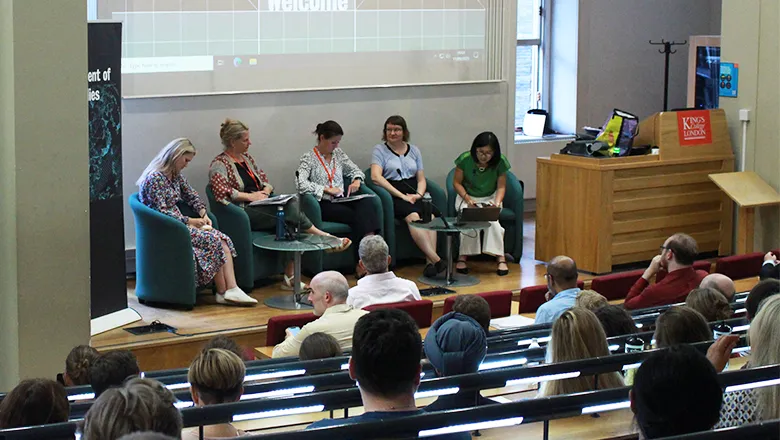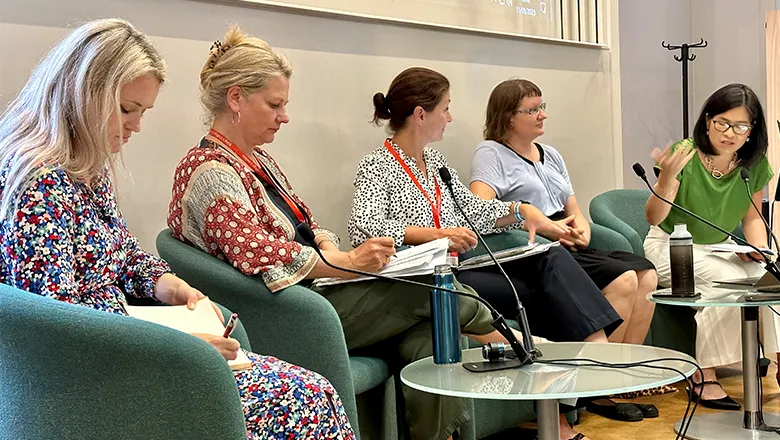“We have witnessed a polarisation of opinions, with the war acting as a catalyst. It has compelled states to take sides, and some have attempted to support those states that traditionally remained neutral but are now tilting towards annoyance. For instance, Georgia, in the past year, has shifted its stance significantly. Just a few weeks ago, they entered into a strategic partnership with China, indicating a move away from their integration policies with NATO. It seems they are trying to shield their country from further escalation".
Professor Tracey German
20 September 2023
King's brings experts together to discuss the geopolitical impact of the War in Ukraine
The School of Security Studies at King's College London hosted the 60th Conflict Research Society Conference, an annual event that brings together experts to address ongoing global conflicts and share innovative research methods. This year, the three-day conference focused on the global ramifications of the Russian Invasion of Ukraine, emphasising its role in altering global power dynamics and worsening worldwide inequalities.

Tracey German, Professor of Conflict and Security in the Defence Studies Department at King’s, said at the conference that there is a need for a broader perspective on global security as the war in Ukraine has shaped significant geopolitical shifts in power and influence.
Professor German also noted that there has simultaneously been a shift in security dynamics towards the Global south as Western organisations, notably the European Union, are increasing efforts to resolve long-standing conflicts in Eurasia and Africa.
Dr Natasha Kuhrt, Senior Lecturer in International Peace and Security in the Department of War Studies, spoke at the panel event “Unravelling Russia’s War against Ukraine: Perspectives and Prospects” on the current and future implications of the strategic partnership between Russia and China. She said that it is important to consider their evolving relationship since 2022, particularly their alignment in the Indo-Pacific, as its reshaping global security dynamics with potential implications on the outcome of the war in Ukraine.
“Russia and China have begun joint bomber patrols in the Indo-Pacific in recent years, specifically around Japan. While previously Russia remained fairly neutral on Indo-Pacific issues it has now begun to echo the Chinese narrative, which views the US Indo-Pacific strategy as 'destructive' and condemns the emergence of minilaterals such as AUKUS and the Quad. The relationship has already prompted NATO to identify the Sino-Russian partnership as a threat, and the Indo-Pacific and the Euro-Atlantic are now becoming a joined-up security space”.
Dr Natasha Kuhrt
Dr Kuhrt also pointed out that the Ukraine war is causing Japan to stop trying to balance its relationship between the US and China because the Western world is coming together through NATO and in the Indo-Pacific to counter Russia's aggression and challenge the partnership between Russia and China. “If Russia loses the war in Ukraine, a new regime in Moscow could reassess its relationship with China, while a Russian win would empower and perhaps embolden China to take risks and test US pledges on Taiwan", she added.
In the context of shared security interests in Central Asia, Dr Kuhrt highlighted that Russia and China, both members of the Shanghai Cooperation Organisation, have introduced an increasingly ideological dimension to the grouping, despite its primary focus not being on security matters.
“Russia is often viewed as the security provider (the 'sheriff) while China is seen as the 'banker' given its important economic role, although the roles are not so clearcut. China needs to protect its economic assets, as Central Asia is an important part of the Belt and Road Initiative. However, so far China has been hesitant to provide security although it does have a military outpost on the Tajik-Afghan border. Russia still has a security presence in the region, but Central Asian states and China may fear a Russian defeat that would leave a security vacuum”.
Dr Natasha Kuhrt
The Conflict Research Society is an interdisciplinary community focused on developing deeper knowledge and understanding of conflict and co-operation. The conference was held from 11 to 13 September at King’s to help build relations between scholars and practitioners interested in the wider dynamics of political conflict, dialogue, diplomacy, and peacebuilding.
More information about the Conflict Research Society here.






